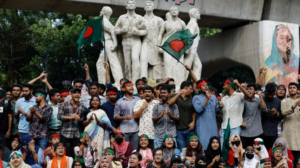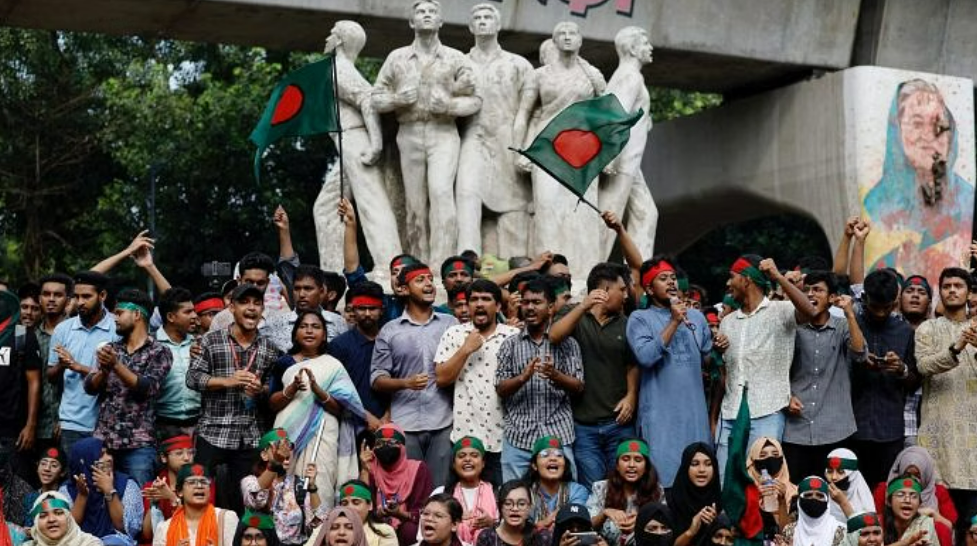Taslima Nasrin, the exiled Bangladeshi author and human rights activist, has often been a vocal critic of various political regimes and social issues in South Asia. Recently, she raised concerns about Bangladesh’s political shift, expressing that the country has become increasingly anti-India and anti-democracy. These sentiments reflect a growing frustration among segments of the population and intellectuals with the direction Bangladesh has taken under certain leadership.
Bangladesh’s political history has been shaped by various forces, with Jamaat-e-Islami (JI) being one of the most controversial. While many political parties in the country have evolved, JI has faced criticism for its involvement in the 1971 Liberation War and its alignment with Pakistan. In recent years, questions have arisen regarding JI’s relevance, especially in light of its anti-India rhetoric and its inability to address its past.

Many Bangladeshis, especially millennials and Gen Z, believe that India has propped up a government that is becoming increasingly authoritarian. These generations have grown up in an era where democracy in Bangladesh appears to be weakening, with the ruling government accused of manipulating elections and cracking down on opposition parties and free speech. Nasrin emphasizes that the anti-India sentiment is not based solely on historical grievances, but rather on the current political scenario, where India is viewed as complicit in Bangladesh’s democratic decline.
Jamaat-e-Islami’s Troubled Past: Jamaat-e-Islami’s role during the 1971 Bangladesh Liberation War remains a significant point of contention. The party supported the Pakistani military and opposed Bangladesh’s independence. Many members of JI were involved in paramilitary groups that collaborated with the Pakistan Army, which engaged in widespread atrocities, including genocide and the rape of thousands of women. Despite these actions, JI has never fully acknowledged its role in these events, which continues to cast a shadow over its political legitimacy.
Post-Independence Challenges: After Bangladesh’s independence in 1971, JI was banned due to its opposition to the liberation movement. However, political space was reopened for the party in 1976, leading to its resurgence. By 1979, Jamaat was active in national politics, yet it carried the baggage of its controversial past. The party’s refusal to address its involvement in the 1971 war has made it difficult for it to gain widespread acceptance among the Bangladeshi public.
Hasina’s Rule and India’s Support: Former Prime Minister Sheikh Hasina’s administration cracked down on JI, particularly through the war crimes trials that targeted party leaders. These trials, although controversial in their implementation, resulted in the execution of several top JI leaders. Hasina’s government, with backing from India, took a hard stance against JI due to its Islamist ideology and its historical ties to Pakistan.
India’s support for Hasina was primarily driven by its own security concerns, particularly in its northeastern states. Bangladesh had long been a haven for anti-India insurgent groups, and Hasina’s cooperation in extraditing these leaders solidified her relationship with New Delhi. However, this relationship fueled anti-India sentiment in Bangladesh, especially among younger generations who felt that India’s influence over the Awami League was stifling the country’s political diversity.
Jamaat-e-Islami’s Anti-India Rhetoric: Jamaat-e-Islami has attempted to capitalize on anti-India sentiment to gain political traction. However, relying solely on anti-India rhetoric is insufficient to revive the party. The younger generations, particularly millennials and Gen Z, are highly politicized, and while they may share some anti-India sentiment, they are also acutely aware of JI’s problematic history.
A Path Forward for Jamaat-e-Islami: For Jamaat-e-Islami to remain relevant in Bangladesh’s evolving political landscape, it must undergo significant transformation. This could involve changing the party’s name and forming a new political entity that is more inclusive, offering leadership roles to women, minorities, and younger leaders. Such a move would signal a departure from the party’s past and help it appeal to a broader electorate.
The Rise of Anti-India Sentiment in Bangladesh: Anti-India sentiment has been rising in Bangladesh, particularly among the younger population. Nasrin highlights that the increasing discontent stems from a perception that India has been excessively involved in Bangladesh’s internal affairs, particularly through its close ties with the ruling Awami League and Prime Minister Sheikh Hasina. India’s support for Hasina’s government has often been seen as enabling a regime that stifles political opposition and dissent.
Erosion of Democracy: According to Taslima Nasrin, democracy in Bangladesh is in a perilous state. The political climate has been marked by suppression of dissent, curbing of press freedom, and the marginalization of opposition parties. Many critics, both inside and outside the country, have accused the Awami League government of centralizing power, conducting flawed elections, and using law enforcement to silence critics.
Read : Bangladesh PM’s Controversial Statement on ‘BoycottIndia’ Campaign
Nasrin argues that the authoritarian tendencies of the current government are eroding the very foundations of democracy in Bangladesh. Citizens are disillusioned with the lack of transparency in governance, the weakening of democratic institutions, and the growing atmosphere of fear and repression.
The Influence of Religious Extremism: Nasrin, known for her outspoken views against religious fundamentalism, also points out that the rise of religious extremism in Bangladesh is a contributing factor to the country’s democratic decline. Islamist groups have gained influence in recent years, pushing for a more conservative and theocratic agenda. This rise in extremism has led to increasing attacks on secularism and free expression, areas that Nasrin has long championed.
The interplay between religious extremism and politics has created a volatile environment where dissenting voices, especially those advocating for secularism or criticizing religious institutions, are often targeted. Nasrin herself has been a victim of such extremism, having been forced to live in exile due to her outspoken criticism of Islamic fundamentalism.
A Call for Change: In her critiques, Taslima Nasrin calls for Bangladesh to return to its democratic roots and move away from the authoritarian path it appears to be following. She emphasizes the need for political reforms, free and fair elections, and the protection of civil liberties. Nasrin also believes that Bangladesh must strike a balance in its foreign relations, ensuring that its political sovereignty is respected and not compromised by external influences.
Conclusion: Taslima Nasrin’s observations about Bangladesh becoming increasingly anti-India and anti-democracy resonate with many who are concerned about the country’s political future. The rise of authoritarianism, suppression of dissent, and growing religious extremism are alarming trends. Nasrin urges the nation to reclaim its democratic values, promote political inclusivity, and foster a society where freedom of speech and civil liberties are protected.

